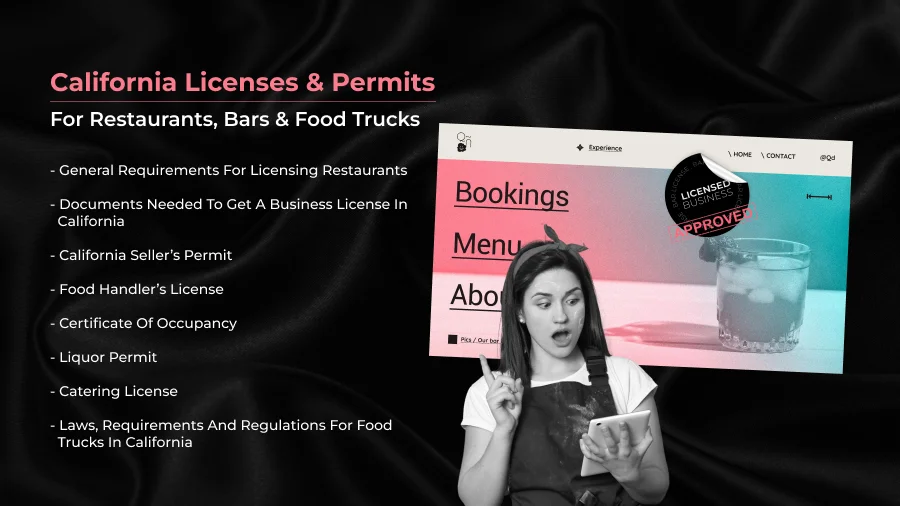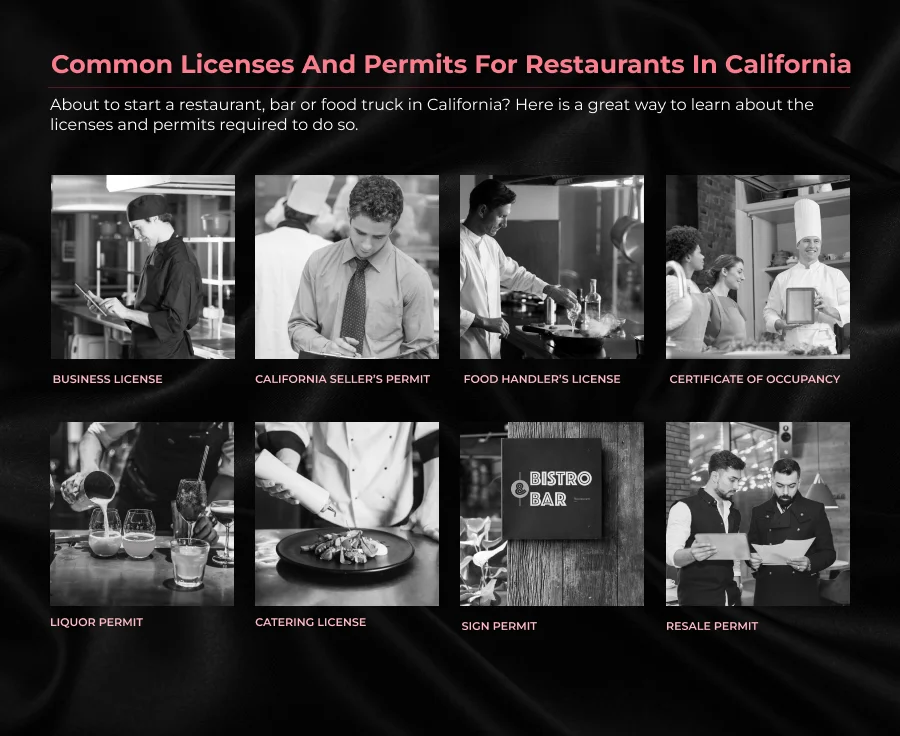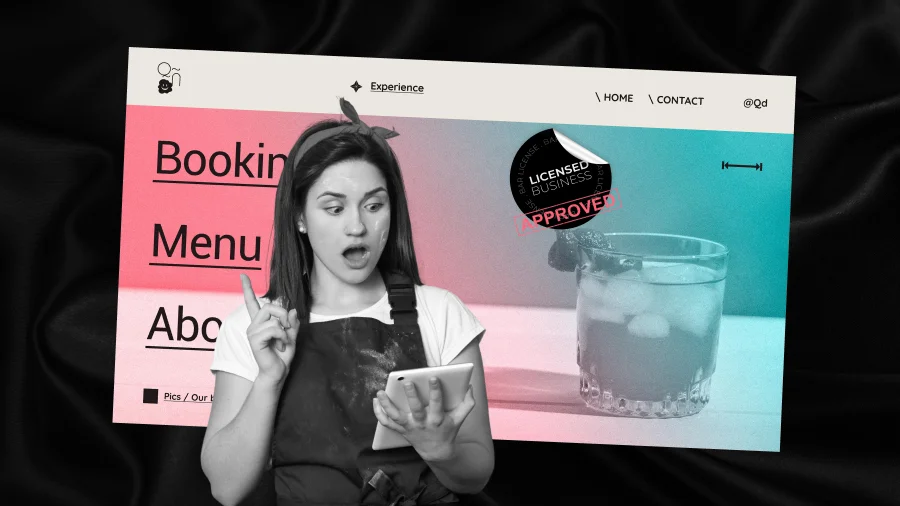California licenses and permits for restaurants, bars and food trucks
Licenses and permits are mandatory for opening a restaurant, café, bar or any other food business. The requirements for procuring a liquor license, food facility health permit, certificate of occupancy vary at times and overlap at other times. A restaurant, bar or food truck owner must, therefore, know what exactly is needed to legally open a restaurant in a specific city or county in California. Starting with a California seller’s permit, there are several licenses and permits needed for the restaurant, bar or food truck.
Start by deciding the location in which you will start your operations. A business license is basically essential. The cost will vary depending on the county or city that issues the license for the restaurant, bar or food truck. Since the license and permit requirements differ everywhere, be aware of the local regulations and permits. For California specific information, check the website calgold.ca.gov. It is an authentic source of information on the permits and licenses required in different California counties.

- Business license that is issued by the locality in which the food outlet will operate
- Employer Identification Number (EIN)
- Health permit from the county where you will be located and operate
- Seller’s Permit
- Liquor License
Once an exhaustive restaurant business plan has been drafted and your funding process completed, the very next step involves securing the necessary licenses and permits. It is important to start this process right from the beginning as some may take weeks or even months to be sanctioned. For this, one must know exactly what licenses and permits need to be obtained.

If you are starting a restaurant, bar or food truck in California, you have a handy guide in the form of CalGold. It lets any business owner type in their county and business type after which it presents the list of permits and licenses that must be obtained.
The following are some of the most common licenses and permits that would be needed in California:
- Business License
- California Seller’s Permit
- Food Handler’s License
- Certificate Of Occupancy
- Liquor Permit
- Catering License
- Sign Permit
- Resale Permit
- Let us now look at each license separately
California Business License
You will need a business license from the time you start doing the groundwork of the restaurant, bar or food truck business. This is also known as a business tax certificate and helps the business to comply with tax rules and regulations.
As far as California is concerned, business licenses are controlled and issued by the city or county in which you live. If your food business is going to operate from multiple locations across various cities and counties, separate business licenses must be acquired from each of these jurisdictions.
Documents Needed To Get A Business License In California:
- An EIN – It is the federal identification number that is used for all kinds of filings, reports and tax withholding accounts of the employees. This number can also be used to make estimated tax payments. Filing an EIN is easy and requires no filing fees. This EIN number is also known as a tax ID number. Visit irs.gov to apply for the number.
- Business Classification – Decide whether the business is going to be a Limited Liability Company, run on a sole proprietorship model or partnership structure.
- Business Name – A fictitious business name is necessary to register the restaurant, bar or food truck with the state to open a bank account, function as a legitimate business entity and be legally recognized in court. The registration of the name can be done at businessportal.ca.gov. If you are going to use an already legal name, registration will not be necessary.
- An Address And Phone Number – Providing details of the place that you reside along with a valid phone number is essential for all legitimate transactions in the future.
- A Thorough Restaurant Business Plan – Even before you open the doors of the food outlet to your customers, a business plan is the owner’s North Star helping him navigate effortlessly through every step in the process of starting the business. It is a document that organizes the owner’s vision and ensures that nothing is overlooked.
- A COI For The Business Insurance Policy – Certificate Of Insurance (COI) verifies the existence of an insurance policy and presents the key aspects and conditions of the policy as a summary. A COI gives information about the policy holder’s name, policy’s effective date, type of coverage, policy limits and other crucial policy data.
California Seller’s Permit
Seller’s permit is essential for any business that plans to sell tangible goods that are subject to sales tax. Application for the seller’s permit can be registered online through the California Department of Tax And Fee Administration. No fee is involved in the application for a seller’s permit. But one might be asked to pay a security deposit. In case the business closes suddenly due to loss or other reasons, this money will be used to settle the unpaid taxes.
Food Handler’s License
Also known as a food service license or an employee health permit, this allows any type of food business to safely serve and sell food in a physical space. This license is required to make sure that employees of the restaurant are aware of their roles and responsibilities in safeguarding diners from foodborne illness. This license is also known as the California Food Handler Card. Employees working in a restaurant’s kitchen or serving food to customers must get their Food Handler Card within 30 days of being hired. However, bussers and general managers may not be required to acquire this license. The latter must possess a Food Protection Manager Certification. Once the employees pass a food safety and preparation test with a minimum of 70%, they will be given their food handler’s card. Taking up the test and acquiring the license will not cost more than $15.
Certificate Of Occupancy
This is issued to certify that the building you are about to occupy and operate in has been constructed and maintained well. Once the commercial space in which the restaurant will operate qualifies the final building inspection, the local building or zoning department of the city will issue the certificate of occupancy. The procedure will vary depending on the jurisdiction in which you are located and the building’s structure. The building must pass a series of inspections that would check the sturdiness of the building, its plumbing, electrical and fire safety. For obtaining this certificate, the county or province’s building department must be contacted.
Liquor Permit
The food service license is not sufficient if you are going to serve liquor in your restaurant. A liquor license must be specifically procured to legally serve alcohol in the restaurant. Every state in the US has its own Alcohol Beverage Control Board (ABC). To learn about your state’s laws and processes and initiate the process of obtaining the liquor license, this ABC board must be contacted. This board regulates the sale of alcohol in the state. There are two types of liquor licenses: on-premise and off-premise. The former will be needed if the alcohol sold is consumed within the business premises like a bar or restaurant. An off-premise license would be needed if the alcohol is taken outside the business premises for consumption. For instance, a liquor or grocery store. The right permit must be obtained for the type or amount of alcohol served. While a restaurant liquor license is a general one permitting you to serve all types of alcohol, there are also other types like beer and wine liquor license, tavern liquor license, etc.
Catering License
If you are a new caterer, you surely will need a caterer permit. This specific caterer permit goes beyond the standard food handler permit. Getting a caterer permit is most often a part of acquiring a health permit or health inspection. The cost involved varies based on the locality. Mostly, getting this permit comes under the state’s food, zoning and liquor codes.
Sign Permit
A sign permit must be obtained from the city (local) government before the restaurant owner can put up signage of any nature to attract customers to the food outlet. The standards regarding the size, location and lighting of the signage varies from one city to another. If your space is rented or on lease, one must also get a written approval from the landlord to substantiate the official sign permit. It is important to be aware of the city’s specific requirements and not make assumptions.
Resale Permit
This permit allows a restaurant to make specific non-taxable purchases if they are going to be used for manufacturing resale products. A resale certificate removes the need for double collection of sales tax on such purchases. That is, instead of collecting sales tax on the product bought first, it is collected only when the customer buys it. Application for this permit can be submitted via the government website.

Laws, Requirements And Regulations For Food Trucks In California
If you are going to run a food truck, then you must not only acquire all the above stated licenses and permits, but also comply with food safety ordinances, Occupational Safety and Health Administration (OSHA) regulations, proper waste disposal regulations, driving regulations, public health laws, tax laws, parking regulations, driving license laws, liquor laws, regulations governing temperature control for food and much more.
Laws, Requirements And Regulations For Bars In California
Based on the location and the menu you have designed for your bar; you will also require other permits that include:
Live entertainment license must be procured if you are going to allow musicians to perform live, if there is going to be a karaoke or dance performances.
- Music license to be able to play music – either stage live performances, play or stream music.
- A dumpster placement permit that will specify where to place the trash dumpster outside the bar.
- A valet parking permit if customers are going to be offered this facility
- Sidewalk permits if you are planning an outside seating facility
This blog would have provided you with great insights into the licenses and permits required for restaurants, bars and food trucks in California. If you are a restaurant owner seeking professional help in restaurant website building and any kind of digital marketing services for restaurants, get in touch.
